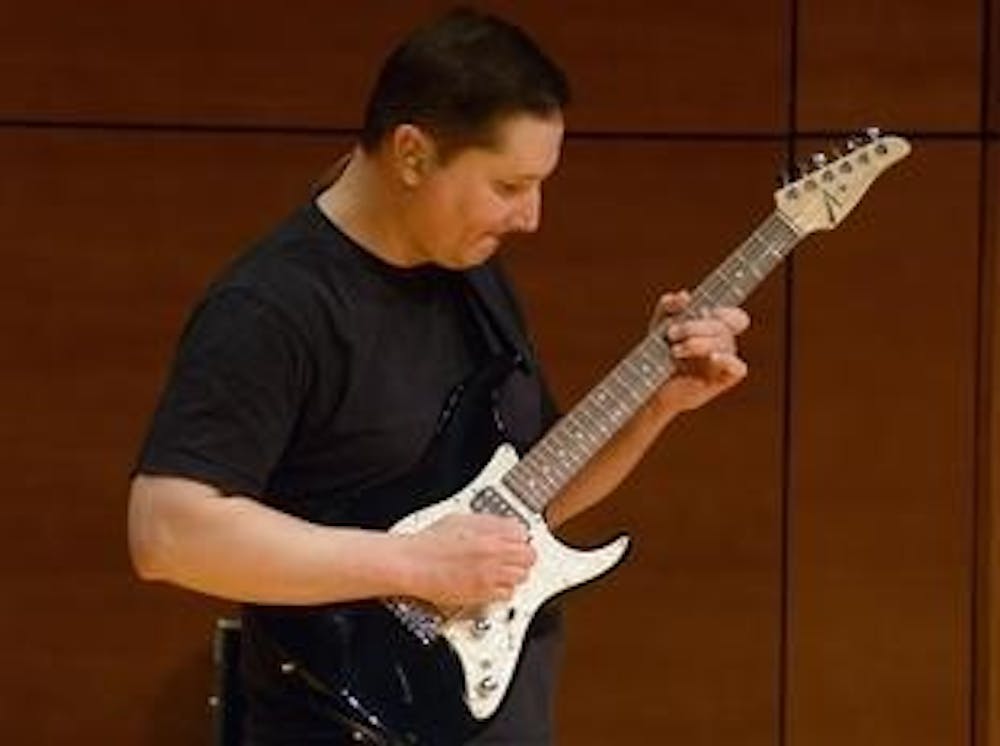The image of the average Penn student is that of someone who never really slows down, overextending themselves because of their passion. When speaking to Matt McCloskey, a jazz and rock guitarist in the Blutt College House Music Program, one realizes that this mentality extends to faculty as much as it does to students.
Between private half–credit music lessons on weekday afternoons, Monday night jazz combo coaching, and rehearsals, performances, and recording sessions for the three ensembles he regularly plays with, not to mention one–time gigs and substitutions for unavailable guitarists, Matt estimates that he spends between 40 and 50 hours a week playing the guitar, but he wouldn’t have it any other way.
Matt has been playing the guitar for the better part of his life, but it took him some time to appreciate the instrument for what it was. He began taking lessons from a classically trained instructor in his home state of Connecticut at the age of nine, but he didn’t catch the musical bug until getting his first electric guitar at the age of 12, along with a “hip young guy” of an instructor. From there, he formed a classic rock band that lasted him through high school and gained some success along the way: “We never got a record deal or anything,” he says, “but we got a lot of gigs in clubs that we were too young to play in. They would allow us to play as long as we arrived in the back—my dad had to be with us, we’d play, and then we’d have to pick up and leave because we were all under 21.”
Playing with his high school band made Matt realize that he wanted to play music for a living. “My mother was adamant that I go to college and that I get a real job,” he says, “but I thought, well, if I’m going to go to college, I do want to be a music major.” After touring several colleges in the New England area and being unimpressed with their music programs, he successfully lobbied with his parents to attend a two–year school in California called Musicians Institute. Post–graduation, Matt moved back to Connecticut and began giving guitar lessons. After some time teaching and picking up gigs as a jazz guitarist, he began taking classes at UConn, “playing and teaching [his] way through [his] bachelor’s degree.” It was getting a master’s degree in Jazz Studies at University of the Arts that brought him to Philly and to his current position at Penn.
While Matt does coach the Penn Jazz combos, his primary function at Penn is giving private guitar lessons for credit through the College House Music Program, a job he approaches with a student–specific plan. “The good thing about private, one–on–one lessons is you can essentially develop a loose syllabus, like a game plan for every individual.” He likes to emphasize theory as much as practical skills, especially for those budding jazz guitarists looking to improvise.
As for the kind of student he likes to see, personality is everything. “The most important thing is someone who’s open to lots of different styles and doesn’t have a snobby attitude, [because] you can have someone that’s advanced, but if they have a narrow–minded attitude, if they’re super picky, that’s not fun … they don’t have to love every style of music, but that’s the most important thing.” Matt himself is an example of this openness to new styles. Though his high school band was influenced by the likes of The Police and Led Zeppelin, one of his main performance groups at present is Breckerville, a tribute band for the jazz fusion Brecker Brothers, and he has been known to dabble in blues bands as well.
When it comes to hopeful musicians at Penn, Matt advises them to rethink what it means to do music for a living. “Everybody would like to be a rock star … but that’s like winning the lottery.” Instead of holding out for winning lotto numbers, he advocates “being open to things like teaching and recording and sessions. Those are where you can realistically say, ‘oh, I can do this as a job.’ … See it as a craft, not necessarily a way to get famous.” Strong musicians, he believes, are those who derive enjoyment from playing, not the fame that comes with it. “It shouldn’t be a chore … it should be something you want to do.”







